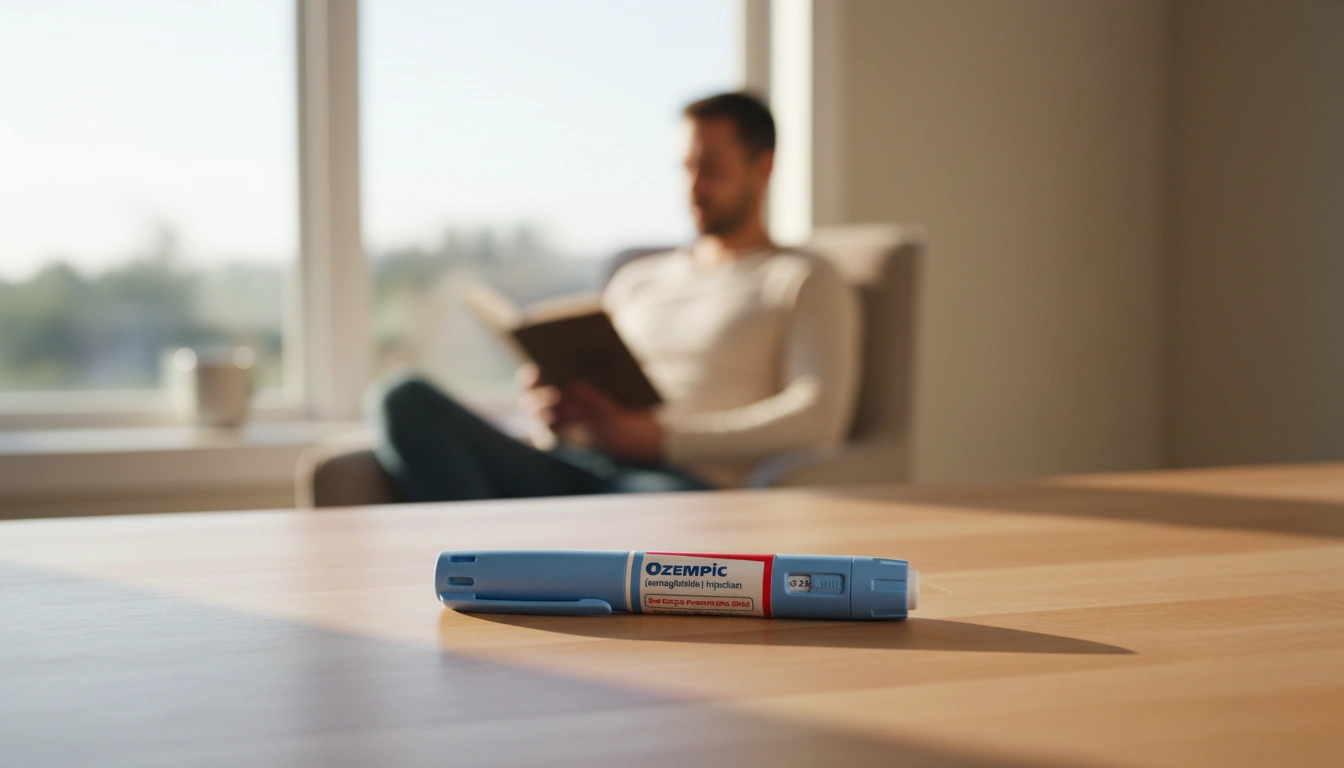How to Avoid Weight Gain After Ozempic: Strategies for Sustainable Success

Introduction
Did you know that a substantial number of individuals who stop taking Ozempic—a medication designed to aid weight loss—regain approximately two-thirds of their lost weight within a year? This alarming statistic sheds light on a crucial aspect of weight management that many people overlook: the transition from medication to sustainable lifestyle changes. As we embark on this journey together, we aim to provide you with effective strategies for maintaining your weight loss after discontinuing Ozempic and similar GLP-1 receptor agonists.
The current landscape of weight management is evolving, with medications like Ozempic gaining popularity for their effectiveness in promoting weight loss. However, understanding how to navigate the challenges associated with stopping these medications is vital for long-term success. By the end of this blog post, we will explore various techniques to help you avoid weight gain after Ozempic, emphasizing a holistic approach that incorporates diet, exercise, and emotional well-being.
Our discussion will cover several key areas, including the biological mechanisms that contribute to weight regain, practical dietary strategies, the importance of physical activity, the role of emotional support, and additional therapeutic options. We believe that by addressing these critical components, you can create a sustainable framework for maintaining your weight loss and achieving your health goals.
Join us as we delve into the intricacies of weight management post-Ozempic and discover how to transform this challenge into an opportunity for lasting change.
Understanding the Biological Response to Stopping Ozempic
Ozempic, like other GLP-1 receptor agonists, works by mimicking the effects of a hormone called GLP-1, which is crucial in regulating appetite and glucose metabolism. When you take Ozempic, it helps you feel fuller longer, slows gastric emptying, and enhances insulin sensitivity. However, once you stop taking the medication, your body may revert to its previous state, leading to increased hunger and potential weight regain.
The Mechanisms Behind Weight Regain
- Increased Appetite: Upon discontinuation of Ozempic, many individuals experience a resurgence of appetite due to the absence of the medication’s appetite-suppressing effects. This can lead to increased caloric intake and the potential for weight gain.
- Metabolic Adaptations: Weight loss often triggers metabolic adaptations, where your body becomes more efficient at storing energy. This means that after stopping Ozempic, your body may resist further weight loss or even encourage weight gain as it attempts to return to its set point.
- Hormonal Changes: The hormonal balance that was altered by Ozempic can shift back quickly once the medication is stopped. This can lead to cravings and increased food consumption, further complicating the weight maintenance process.
Understanding these biological responses is essential for developing effective strategies to counteract them. By recognizing how your body reacts after discontinuing Ozempic, you can take proactive steps to maintain your weight loss.
Practical Dietary Strategies for Weight Maintenance
1. Focus on Nutrient-Dense Foods
To counteract the increased appetite you may experience after stopping Ozempic, it’s crucial to prioritize nutrient-dense foods that promote satiety. Foods rich in fiber and protein can help you feel full longer, thereby reducing the likelihood of overeating. Consider incorporating the following into your diet:
- Fruits and Vegetables: Aim for at least five servings of a variety of colorful fruits and vegetables each day. They are low in calories and high in fiber, which can help you feel fuller.
- Lean Proteins: Include sources of lean protein such as chicken, fish, legumes, and low-fat dairy. Protein has been shown to enhance feelings of fullness and can help preserve lean muscle mass during weight loss maintenance.
- Whole Grains: Opt for whole grains like quinoa, brown rice, and oats over refined grains. These foods are high in fiber and can aid in digestion and satiety.
2. Implement Mindful Eating Practices
Mindful eating can be a powerful tool to help you manage your portion sizes and avoid overeating. Here are some strategies to enhance your mindful eating habits:
- Slow Down: Take your time to chew and savor each bite. This allows your brain to register fullness, reducing the chances of overeating.
- Listen to Your Body: Pay attention to hunger and fullness cues. Eat when you’re hungry and stop when you’re satisfied, rather than eating out of habit or boredom.
- Eliminate Distractions: Try to eat without distractions, such as television or smartphones. This can help you focus on your meal and enjoy the experience more, making it easier to recognize when you are full.
3. Moderate Carbohydrate Intake
Reducing your carbohydrate intake can be an effective way to manage hunger and cravings. Research has shown that a moderate carbohydrate approach can lead to better satiety and weight management. Aim for about 130 grams of carbohydrates per day, and focus on high-fiber sources such as:
- Legumes: Beans, lentils, and chickpeas are excellent sources of protein and fiber.
- Vegetables: Non-starchy vegetables like leafy greens, broccoli, and cauliflower can provide volume and nutrients without excessive calories.
- Healthy Fats: Incorporate sources of healthy fats, such as avocados, nuts, and olive oil, which can enhance fullness and satisfaction.
The Role of Physical Activity in Weight Maintenance
Regular physical activity is essential for maintaining weight loss and overall health. Here’s how exercise can support your weight management journey:
1. Incorporate a Balanced Exercise Routine
Aim for a combination of cardiovascular exercise and strength training to maximize your weight maintenance efforts:
- Cardiovascular Exercise: Engage in at least 150 minutes of moderate-intensity aerobic activity each week, such as brisk walking, cycling, or swimming. This can help burn calories and improve cardiovascular health.
- Strength Training: Include strength training exercises at least two days a week. Building lean muscle mass can increase your resting metabolic rate, making it easier to maintain weight loss.
2. Find Enjoyable Activities
Choose physical activities that you enjoy to make it easier to stay consistent. Whether it’s dancing, hiking, or joining a fitness class, finding joy in your workouts can help you stay motivated and committed to regular exercise.
3. Set Achievable Goals
Establish realistic and specific fitness goals to keep you on track. These goals can be related to frequency, duration, or intensity of your workouts. Tracking your progress can also provide motivation and help you stay accountable.
Seeking Emotional Support and Accountability
The psychological aspects of weight management are just as important as the physical components. Here are some ways to seek support during your transition:
1. Build a Support Network
Surround yourself with individuals who understand your weight management journey. This can include friends, family, or support groups. Sharing your experiences and challenges can provide emotional relief and encouragement.
2. Work with a Professional
Consider consulting with a registered dietitian or a nutritionist who specializes in weight management. They can provide personalized guidance, meal planning, and strategies to address emotional eating patterns.
3. Engage in Therapy or Counseling
If emotional eating or psychological barriers are affecting your weight maintenance, seeking therapy or counseling can be beneficial. Professionals can help you explore the underlying issues and develop healthier coping mechanisms.
Exploring Additional Therapeutic Options
While lifestyle changes are essential, it’s important to explore any additional therapeutic options that may support your weight maintenance journey:
1. Consider Tapering Instead of Abrupt Discontinuation
Recent studies suggest that tapering off Ozempic gradually may help individuals maintain their weight more effectively than stopping abruptly. Consult with your healthcare provider about developing a tapering plan that suits your needs.
2. Explore Other Medications
If you find it challenging to maintain your weight without Ozempic, discuss alternative medications with your healthcare provider. There may be other options available that can help support your weight management efforts.
Conclusion
Navigating weight maintenance after stopping Ozempic can be challenging, but it is certainly achievable with the right strategies in place. By understanding the biological mechanisms behind weight regain, adopting practical dietary changes, incorporating regular physical activity, and seeking emotional support, you can create a sustainable framework for maintaining your weight loss.
Remember, weight management is a journey that requires patience and commitment. As we at TrimRx emphasize, embracing healthier lifestyles through personalized care and support is key to achieving your goals. If you’re currently on your weight loss journey or considering the use of medications like Ozempic, we encourage you to take our free assessment quiz to explore your eligibility for our personalized weight loss programs, which include medically supervised care and ongoing support.
By implementing these strategies and staying proactive in your weight management journey, you can avoid weight gain after Ozempic and create a healthier, more fulfilling lifestyle.
FAQ
What should I do if I start to regain weight after stopping Ozempic?
If you notice weight regain, reassess your dietary habits and exercise routine. Consider seeking support from a healthcare professional or a registered dietitian to help you get back on track.
How long should I stay on Ozempic for effective weight management?
Ozempic is intended for long-term use. However, consult with your healthcare provider to determine the best plan for your individual needs.
Can I take other weight loss medications after stopping Ozempic?
Discuss other medication options with your healthcare provider. They can guide you on what may be suitable based on your health history and weight management goals.
How can I find a support group for weight management?
Look for local community resources, online forums, or counseling services that offer support groups focused on weight management. Connecting with others can provide motivation and encouragement.
What are some quick-access supplements that can support my weight management?
Consider our GLP-1 Daily Support and Weight Loss Boost supplements, which can provide immediate support during your weight management journey. These supplements can complement your overall strategy and help you stay on track.
By staying informed and proactive, you can navigate the challenges of weight management after Ozempic and create a healthier, more fulfilling life. Together, we can embrace this journey toward sustainable wellness!

Transforming Lives, One Step at a Time
Keep reading
Skipping an Ozempic Dose: What You Need to Know
Discover what happens if you skip an Ozempic dose. Learn about immediate and long-term effects, plus expert advice on how to get back on track safely. Don’t risk your progress!
Ozempic Dosing: What is the Therapeutic Dose for Type 2 Diabetes Management?
Curious what is the therapeutic dose for Ozempic? Discover how personalized dosing optimizes blood sugar control & weight management. Learn more now!
Navigating Ozempic Dosing: What is the Smallest Dose of Ozempic and Why It Matters
Curious about what is the smallest dose of Ozempic? Learn why 0.25 mg is the starting point, how it works, and its role in a safe, effective weight loss journey. Discover personalized support today!



